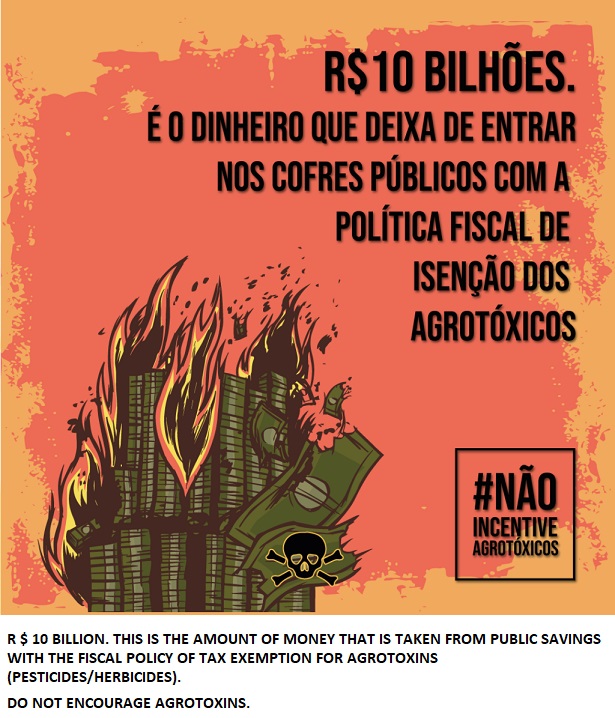10
Apr
Brazilian Government Gives $2.2 Billion in Annual Tax Subsidies to the Multinational Agrichemical Industry
 (Beyond Pesticides, April 9, 2020) Brazilian tax exemptions benefit the agrichemical industry to the tune of $2.2 billion USD annually, according to researchers from the Oswaldo Cruz foundation and the Federal Rural University of Rio de Janeiro. ABRASCO, the Brazilian Association of Collective Health, headed a new study which illuminates a tight relationship between Brazilian government and industry. Researchers additionally point to millions of dollars given from public resource funds to the companies. While industry lobby groups argue that toxic pesticides are necessary for development and food production, environmental and health advocates say the people of Brazil bear the brunt of toxic pesticide contamination while international companies profit.
(Beyond Pesticides, April 9, 2020) Brazilian tax exemptions benefit the agrichemical industry to the tune of $2.2 billion USD annually, according to researchers from the Oswaldo Cruz foundation and the Federal Rural University of Rio de Janeiro. ABRASCO, the Brazilian Association of Collective Health, headed a new study which illuminates a tight relationship between Brazilian government and industry. Researchers additionally point to millions of dollars given from public resource funds to the companies. While industry lobby groups argue that toxic pesticides are necessary for development and food production, environmental and health advocates say the people of Brazil bear the brunt of toxic pesticide contamination while international companies profit.
“It is as if you lived in a condominium and your neighbor didn’t have to pay the condominium fees. And that they got the pool dirty, and the shared gym space, generating costs for everyone else,” says Marcelo Novaes, a São Paulo State public defender who has spent years investigating this issue, “These benefits give large agribusiness companies a break while throwing the cost back on society.”
By value, Brazil is the world’s largest consumer of toxic pesticides. Since President Jair Bolsonaro took office in 2018, the country has rapidly approved new products – a record 474 in 2019. Last August, the country made death the sole criteria for toxicity. Meanwhile, pesticide poisonings are a rampant crisis in Brazil. In 2016, residents registered 4,208 cases of pesticide poisoning across the country. For every registered case, it is estimated that 50 go unreported.
“We are dominated by five large multinationals—Syngenta, Bayer-Monsanto, BASF, Corteva (ex-Dow) and DuPont—who rule over everything because they own 80% of the sector,” says Mr. Novaes, who denounces the companies as an ‘oligopoly’. Only about 5% of approved are produced entirely in Brazil, meaning U.S. and European companies are profiting off of toxic products that are often banned or restricted in their own countries.
Over the past 14 years, the Brazilian National Development Bank granted $80 million in loans to private agrichemical companies and the interest was subsidized. The Ministry of Science and Technology’s Funding Authority for Studies and Projects provided $86 million in research and development funds to large pesticide manufacturers. In 2017, the companies ceased paying almost $2 billion in federal and state taxes.
The tax exemptions are four times the Ministry of the Environment’s budget ($600 million) and double the cost of treating cancer patients in 2017 ($1 billion). Mongabay reports, “A study published in Saúde Pública magazine reveals that for every US$ 1 spent on the purchase of pesticides in the state of Paraná, US$ 1.28 is spent on the SUS [Sistema Único de Saúde/Unified Health System] public health program for the treatment of acute intoxication poisonings—those that occur immediately after application. The calculation left out spending on chronic diseases, those that appear over time due to constant exposure to pesticides, such as cancer.”
The government gives tax breaks under the guise of development and food production, but pesticides are mainly used on commodity crops such as soybeans, corn, and sugarcane. The study concludes, “It would be more reasonable to subsidize not the use of pesticides, but directly the consumption of food.”
Study coauthor Wagner Soares, an economist and graduate level professor in sustainable development practices, says, “Our study clearly showed that it’s time for society to begin to reflect on subsidies for pesticides. First, because we are in the middle of a fiscal crisis in which many sectors are re-evaluating subsidies. But mostly because of the high amount the State is unable to levy.”
Brazil’s Federal Supreme Court will soon make a decision on a lawsuit that challenges the designation of pesticides as essential to development, and instead compares pesticides to products like cigarettes – harmful to health and generative of costs borne by the entire population. This would subject them to increased taxes instead of breaks. The action was brought against the government in 2016, but the session has been postponed to an as-of-yet undetermined date.
As we face global crises of health issues and rapid biodiversity decline, agrichemical companies continue to make billions by peddling poison. Utah Phillips says, “The Earth is not dying, it is being killed, and those who are killing it have names and addresses.” Join us in targeting decision-makers every week with our Action of the Week, and refuse to participate in Brazilian corruption with #boycottbrazilianfood. Opt out of the chemical-intensive paradigm by going organic.
All unattributed positions and opinions in this piece are those of Beyond Pesticides.
Source: Mongabay










